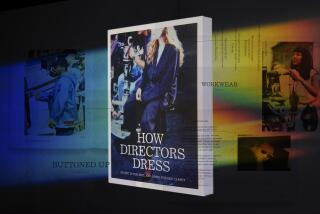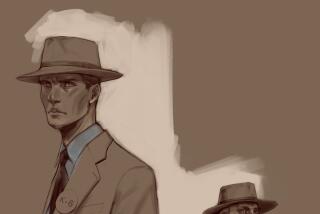Theadora Van Runkle dies at 83; noted Hollywood costume designer
Hollywood costume designer Theadora Van Runkle, whose influence spanned four decades and a range of movie genres including period pieces like “Bonnie and Clyde” — which earned her the first of three Academy Award nominations — and over-the-top comedies like 1989’s “Troop Beverly Hills,” has died. She was 83.
Van Runkle died Friday at Cedars-Sinai Medical Center in Los Angeles of lung cancer, the Costume Designers Guild announced.
Born March 27, 1928, in Pittsburgh, Van Runkle made connections in the entertainment industry not long after that. “She came out here as a baby,” her son Max said, “when her mother came out here to try and make it in Hollywood.”
Van Runkle attended the Chouinard Institute in Los Angeles, and for seven years in the late 1950s and early ‘60s worked at the May Co., illustrating fashion ads. In a 1999 interview with The Times, Van Runkle said she was “at the end of [her] rope as a commercial artist” when she met Oscar-winning costume designer Dorothy Jeakins at a party.
“Dorothy told me she needed a sketch artist,” Van Runkle said. “And the next day I went to work for her.” That was on the movie “Hawaii.”
Later, Jeakins recommended Van Runkle for a job she had turned down and that she described as “a little western over at Warner Bros.” That little western turned out to be 1967’s “Bonnie and Clyde,” a film debut that earned Van Runkle an Academy Award nomination (she lost to “Camelot” costume designer John Truscott) and a Golden Tiberius award from the Italian fashion industry and catapulted her to fame.
“I’d never designed anything before,” Van Runkle told The Times in 1999. “But I knew fashion. I knew style. I knew construction. I sewed by hand and by machine. I learned construction from Vogue patterns.”
For Faye Dunaway’s Bonnie Parker, Van Runkle went with a now-iconic look epitomized by the long cardigan sweater or silk blouse paired with a narrow skirt and topped with a beret — the midi-skirt look — that went on to become a huge trend. Likewise with Warren Beatty’s Clyde Barrow and his double-breasted, wide-lapel suits.
The next year, Van Runkle again dressed Dunaway for “The Thomas Crown Affair,” putting her in some 31 costumes over the course of the heist flick, including mini-skirts, big-belted suits, double-breasted coats, punch-bowl-sized hats and a revealing backless, bra-less chiffon creation. For the same film she worked with Ron Postal to dress co-star Steve McQueen in dashing three-piece suits, accessorized with Persol tortoise sunglasses and Patek Philippe watches.
Van Runkle also dressed Dunaway off-screen, perhaps most memorably for the 1968 Academy Awards ceremony — when Dunaway was nominated for best actress for her portrayal of Bonnie Parker.
Two other films from Van Runkle’s long costume design career earned her Oscar nominations: 1974’s “The Godfather: Part II” and 1986’s “Peggy Sue Got Married.” Another 1974 film she worked on — the hat-heavy “Mame” — earned her the American Millinery Institute’s Golden Crown Award.
Over the course of her career, she created costumes for actors and movies as diverse as Dolly Parton in “The Best Little Whorehouse in Texas,” Steve Martin in “The Jerk,” and Shelley Long in “Troop Beverly Hills,” a film filled with all manner of memorable, over-the-top costumes.
Other movies to her credit include the hippie romp “I Love You, Alice B. Toklas!,” “Bullitt,” “Myra Breckenridge” and “Heaven Can Wait.”
Van Runkle earned a 1983 Emmy for outstanding costume design for a series for a very different sort of period piece — the medieval-themed television show “Wizards and Warriors” — and in 2002 she received the Costume Designer Guild’s Lifetime Achievement Award.
She is survived by son Max, daughter Felicity and grandson Teo.
Services are pending.
More to Read
Start your day right
Sign up for Essential California for the L.A. Times biggest news, features and recommendations in your inbox six days a week.
You may occasionally receive promotional content from the Los Angeles Times.







